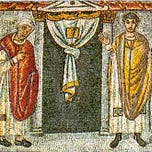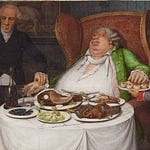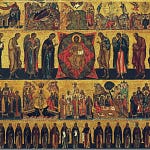It is a rather strange phenomenon when black-and-white meanings or all-or-nothing interpretations are assigned to sacred texts. Am I the Publican or the Pharisee? Am I the Prodigal Son or the Elder Son? Even the obvious ambiguity of the text is often brushed aside, overlooked, or explained away. Christ said that the Publican went down to his house justified. Some have advised to imitate the Publican lest one is condemned with the Pharisee (see Amma Syncletica [Apophthegmata Patrum] among many others). But Christ did not actually say that the Pharisee was condemned. Perhaps he was, but this is not self-evident to me. (It is certainly good advice to imitate the Publican, though solely in his repentance, not his life, perhaps – an emphasis that necessarily must be made.)
Ravenna, Italy, 5th century
***
The word “justified” (δεδικαιωμενος) is not easy to understand in this context. Some of the meanings of this word include, for example, ‘to be declared right or not guilty.’ Of course, Christ could be saying just that: “His sins are forgiven.” Or, He may be referring to what God had said through Hosea: “I desire mercy, not sacrifice”; and again through David: “The sacrifice to God is a broken spirit.” After all, the Pharisee fasted, tithed, and laboured by carrying the heavy burden of the Law – all are forms of sacrifice. Perhaps, “justified” here means “his heart was right,” “his broken spirit was the true meaning of the Law.” Sure, the Pharisee seems to have missed the main point of God’s Law, but why must we necessarily assume that he was condemned?
***
While this is not proper theological reasoning, it seems that from a purely human point of view, the Pharisee tried to live a good and godly life the best he knew how. We focus on the Pharisee’s prideful stance, but overlook the fact that he was not an extortioner, or unjust, or an adulterer. The first two qualities – and perhaps even all three in many cases – are precisely what the first-century Palestinian tax collectors were known for. Before we cast our stone at the Pharisee, let us ask ourselves: what life advice would we give to our own children? Would we not teach them to be not extortioners, not unjust, not adulterers? Would we not encourage them to both fast and to support their local parish – that is to say, to tithe? To be sure, we would want our children to repent like the Publican should they fail in their efforts to live like the Pharisee. After all, it was concerning the Pharisees, not the tax collectors, that Christ said: “Whatsoever they bid you observe, that observe and do…” (Matt 23:3) (The second part of that verse deals with the issue of hypocrisy; but the Pharisee from the Parable, prideful as he may be, does not appear to be a hypocrite – he actually puts his tithe where his mouth is.)
Listen to this episode with a 7-day free trial
Subscribe to Phroneo to listen to this post and get 7 days of free access to the full post archives.













